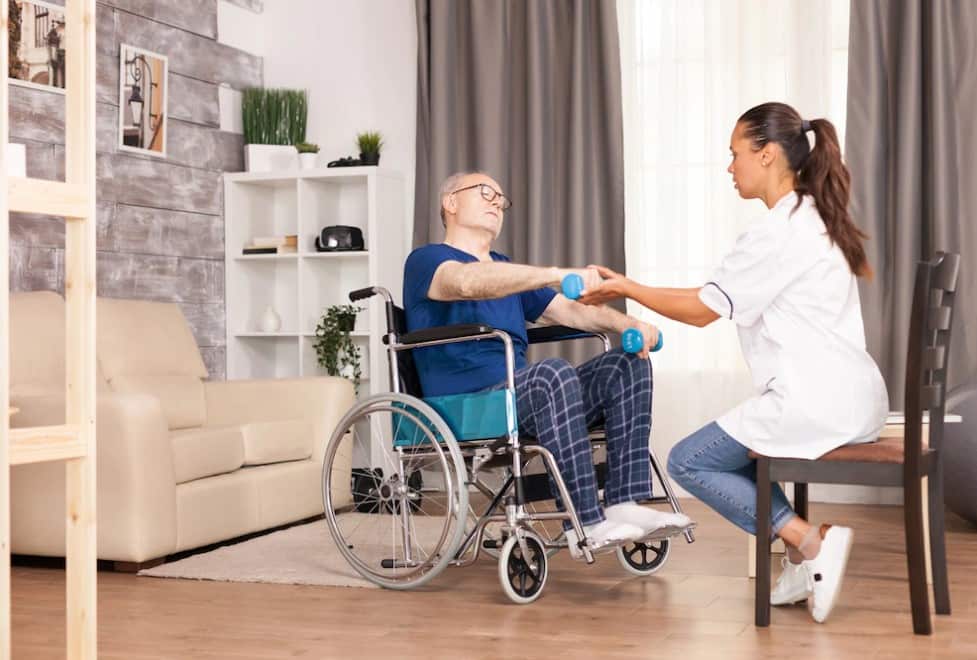How disability support in the home enhances autonomy
The Relevance of Handicap Solutions and the Effect of Home Care Providers
Disability services are essential for boosting the lives of people with specials needs. They provide important support that fosters freedom and wellness. Home treatment carriers play a crucial function in this framework by supplying individualized help tailored to one-of-a-kind requirements. This support not just advantages individuals yet additionally eases the pressure on family caregivers. Understanding these characteristics discloses a deeper link in between care, area, and autonomy. What exists ahead for these crucial solutions and their impact?
Recognizing Impairment Providers
While numerous might not completely realize the complexities of handicap services, they play a crucial role in boosting the lifestyle for people with disabilities. These solutions encompass a large array of support group designed to aid individuals in navigating day-to-day challenges. From offering accessibility to education and employment possibilities to facilitating health care and recovery, impairment services intend to advertise independence and inclusion.Key components include instance monitoring, advocacy, and assistive technology, which assist people attain individual objectives. Additionally, community-based programs typically cultivate social links, minimizing feelings of seclusion. Numerous companies and federal government entities collaborate to guarantee that individuals receive tailored support according to their special requirements. Recognizing these solutions is crucial, as they encourage individuals with handicaps to lead satisfying lives, proactively join their areas, and understand their possibility. Inevitably, reliable disability services are fundamental to advertising equity and access for all.

The Function of Home Care Providers
Home treatment carriers play an important function in providing individualized support to individuals with impairments, enabling them to preserve freedom in their very own homes - ndis providers. These professionals provide a variety of solutions tailored to satisfy the distinct requirements of each individual, guaranteeing that support is both relevant and effective. They aid with day-to-day tasks such as dish prep work, personal hygiene, and medication monitoring, which are crucial for boosting the lifestyle for those they serve.Moreover, home treatment suppliers function as an important link between people and their medical care needs, helping with communication with physician and collaborating required services. Their visibility likewise minimizes the burden on family caretakers, promoting a healthier vibrant within homes. By fostering a secure and helpful environment, home treatment companies empower people with impairments to engage with their neighborhoods, pursue individual rate of interests, and ultimately lead satisfying lives while remaining in the convenience of their homes
Personalized Care and Assistance
Customized care and support are essential elements of effective home treatment services, as they cater to the specific demands and preferences of each person with an impairment. Home treatment providers examine the unique needs of each customer, creating tailored plans that prioritize their convenience, health, and wellness. This individualized method not just boosts the quality of treatment but also cultivates a sense of self-respect and respect.Caregivers are educated to adapt their approaches, guaranteeing that services straighten with the client's way of living, cultural history, and personal choices. Routine communication in between customers and caretakers assists to fine-tune treatment strategies, attending to any kind of transforming demands quickly. Additionally, the focus on individualized assistance encourages the advancement of trust fund and connection, which can significantly enhance the total caregiving experience. Eventually, customized treatment and assistance encourage individuals with handicaps to obtain the support they need in a way that feels respectful and verifying.
Enhancing Self-reliance for Individuals
Enhancing freedom for people with disabilities is a basic goal within home treatment solutions. These solutions supply customized support that encourages clients to participate in everyday activities autonomously (ndis providers). By providing aid with individual treatment, flexibility, and home tasks, home treatment providers enable individuals to preserve a feeling of control over their lives. This autonomy promotes self-confidence and strength, necessary parts in the trip toward independence.Furthermore, home care solutions usually include skill-building chances that educate people adaptive strategies, improving their capability to perform jobs individually. This support not only meets instant needs however also advertises long-lasting self-sufficiency. Additionally, caretakers can help in creating a setting that fits private preferences and capabilities, ensuring that clients really feel safe and comfy. On the whole, the focus on improving self-reliance through home treatment services is significant in promoting dignity and quality of life for individuals with specials needs
Structure Area Inclusivity
While promoting individual self-reliance is necessary, developing area inclusivity for people with disabilities is just as essential. Inclusivity enhances social links, enabling individuals to participate fully in community life. Community involvement initiatives, such as awareness campaigns and comprehensive events, play a considerable duty in damaging down obstacles and difficult misconceptions regarding disabilities.Accessible public spaces and transportation alternatives are essential components that assist in participation and combination. Partnership among local organizations, services, and campaigning for groups can produce encouraging networks that motivate inclusivity. Additionally, training neighborhood a knockout post participants on special needs understanding fosters empathy and promotes a culture of acceptance.Ultimately, a comprehensive area not just benefits individuals with disabilities but enriches the whole social material by accepting variety. By recognizing and dealing with the distinct needs of individuals with specials needs, neighborhoods can cultivate a setting where everybody has the chance to prosper and add meaningfully.
The Influence on Caretakers and family members
Many families and caregivers of individuals with handicaps experience a profound effect on their every day lives and emotional well-being. The obligations related to caregiving can lead to significant physical and emotional strain, typically resulting in caregiver tiredness. This can diminish their ability to provide effective support and produce a caring setting. In addition, the emotional toll can result in sensations of isolation and anxiety, influencing family members dynamics and relationships.Access to handicap solutions and home care providers can minimize some of these worries by providing needed support and sources. These solutions make it possible for families to share caregiving responsibilities, enabling caregivers to concentrate and take breaks by themselves health and wellness. Improved assistance networks cultivate a sense of neighborhood, which can boost emotional durability. Inevitably, the visibility of comprehensive special needs solutions significantly influences households, advertising much better wellness outcomes and boosting the lifestyle for both caretakers and people use this link with disabilities.
Future Fads in Handicap Providers and Home Care
As the landscape of disability services and home treatment progresses, technology assimilation is becoming significantly popular. This shift permits more customized support versions that satisfy individual needs and choices. By utilizing cutting-edge devices, providers can boost care quality and boost end results for those they serve.
Modern Technology Assimilation in Treatment
The combination of innovation in handicap solutions and home care is transforming the way treatment is supplied and experienced. Advanced devices such as telehealth platforms, wearable gadgets, and wise home systems improve access and interaction in between caretakers and customers. These modern technologies promote real-time surveillance of wellness metrics, permitting prompt interventions and individualized treatment changes. Furthermore, mobile applications equip individuals with disabilities to manage their own care strategies and accessibility resources much more efficiently. Automation and expert system are improving administrative jobs, liberating caregivers to concentrate on supplying top quality assistance. As innovation continues to progress, its combination within these sectors assures to improve end results, boost independence for customers, and enhance source allowance for service providers.
Personalized Assistance Models
While typical care versions commonly take on a one-size-fits-all technique, the future of disability solutions and home care is progressively leaning towards customized support models that accommodate the unique requirements of each person. These designs stress cooperation between treatment service providers, people, and their households, making certain that services align with individual choices and particular obstacles. By leveraging assessments and comments, carriers can tailor treatments, whether they entail daily living assistance, restorative activities, or psychological assistance. This individualized method not just boosts the quality of treatment however additionally promotes greater self-reliance and health amongst individuals with impairments. As understanding of these advantages expands, personalized support versions are poised to become the requirement in special needs solutions and home treatment, changing the landscape of care shipment.
Often Asked Inquiries
What Qualifications Do Home Care Providers Generally Required?
Home care companies usually need a secondary school diploma or equivalent, conclusion of a state-approved training program, accreditation in mouth-to-mouth resuscitation and initial help, and usually a history check to ensure security and dependability for get more customers.

Just How Are Impairment Provider Funded and Accessed?
Special needs services are generally funded through government programs, private insurance, and gives. Accessing these solutions commonly includes evaluations, eligibility criteria, and applications, which differ by area and certain requirements of individuals looking for help.
Can Home Care Providers Be Custom-made for Certain Disabilities?
Home care solutions can undoubtedly be customized to meet the distinct needs of people with particular impairments. This modification permits for tailored assistance, boosting the high quality of care and boosting the general health of customers.
What Prevail Obstacles Encountered by Home Treatment Providers?
Common obstacles faced by home treatment companies consist of staffing lacks, insufficient training, communication barriers with clients and households, differing degrees of customer needs, taking care of insurance coverage intricacies, and guaranteeing regular top quality of treatment across different environments.
Just How Can Families Discover Dependable Handicap Services in Their Area?
Family members can locate trusted impairment solutions by looking into local companies, consulting online directory sites, looking for suggestions from medical care specialists, and connecting with support system. Complete assessments and interviews with solution carriers help guarantee high quality and compatibility with requirements. Personalized care and support are crucial parts of effective home care services, as they cater to the specific demands and choices of each person with an impairment. By offering help with individual treatment, mobility, and home tasks, home care companies allow people to preserve a sense of control over their lives. The assimilation of technology in disability solutions and home treatment is changing the means treatment is supplied and experienced. While standard treatment designs often adopt a one-size-fits-all strategy, the future of handicap solutions and home treatment is significantly leaning towards personalized assistance models that provide to the unique requirements of each person. Home treatment solutions can undoubtedly be personalized to meet the unique demands of individuals with particular impairments.